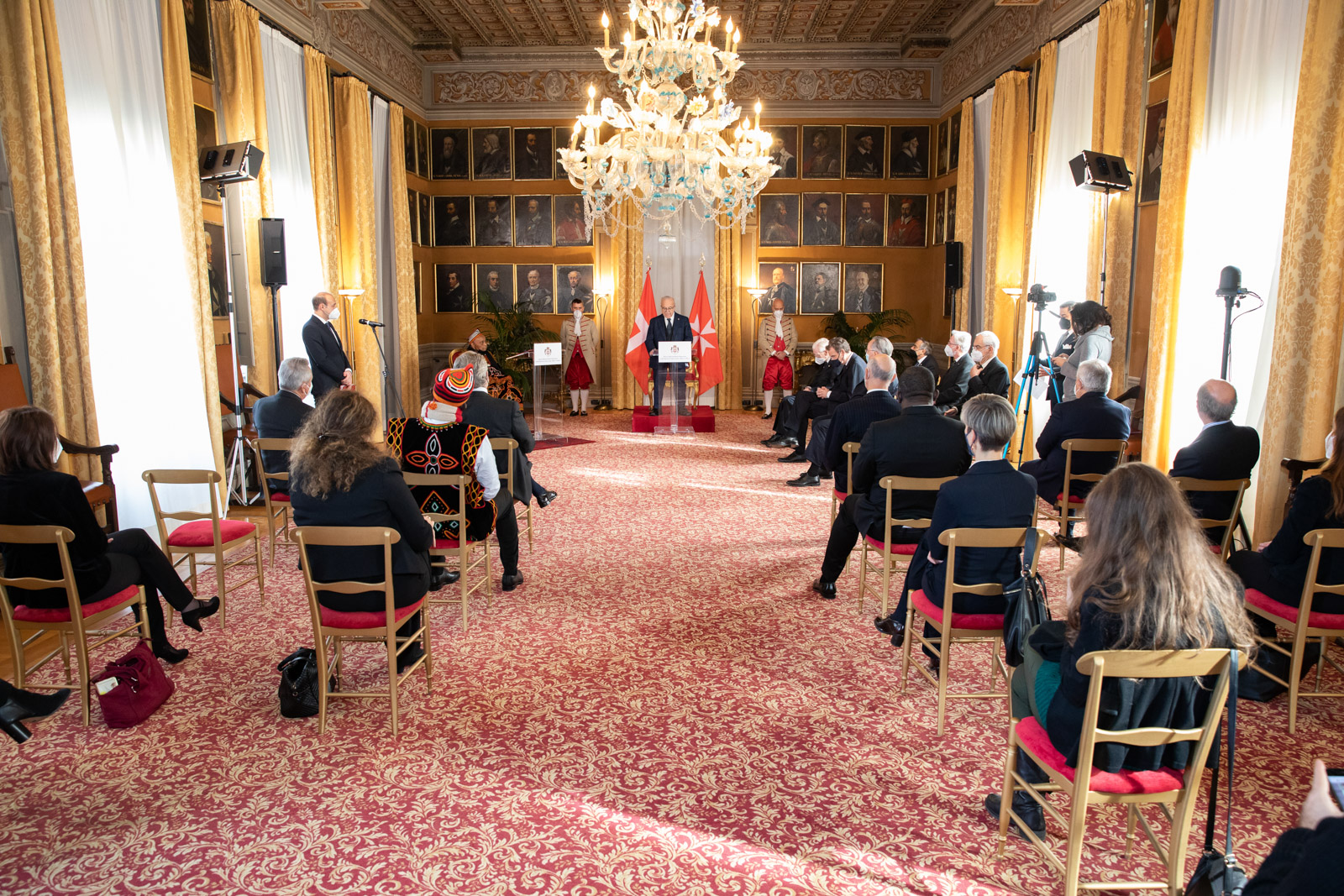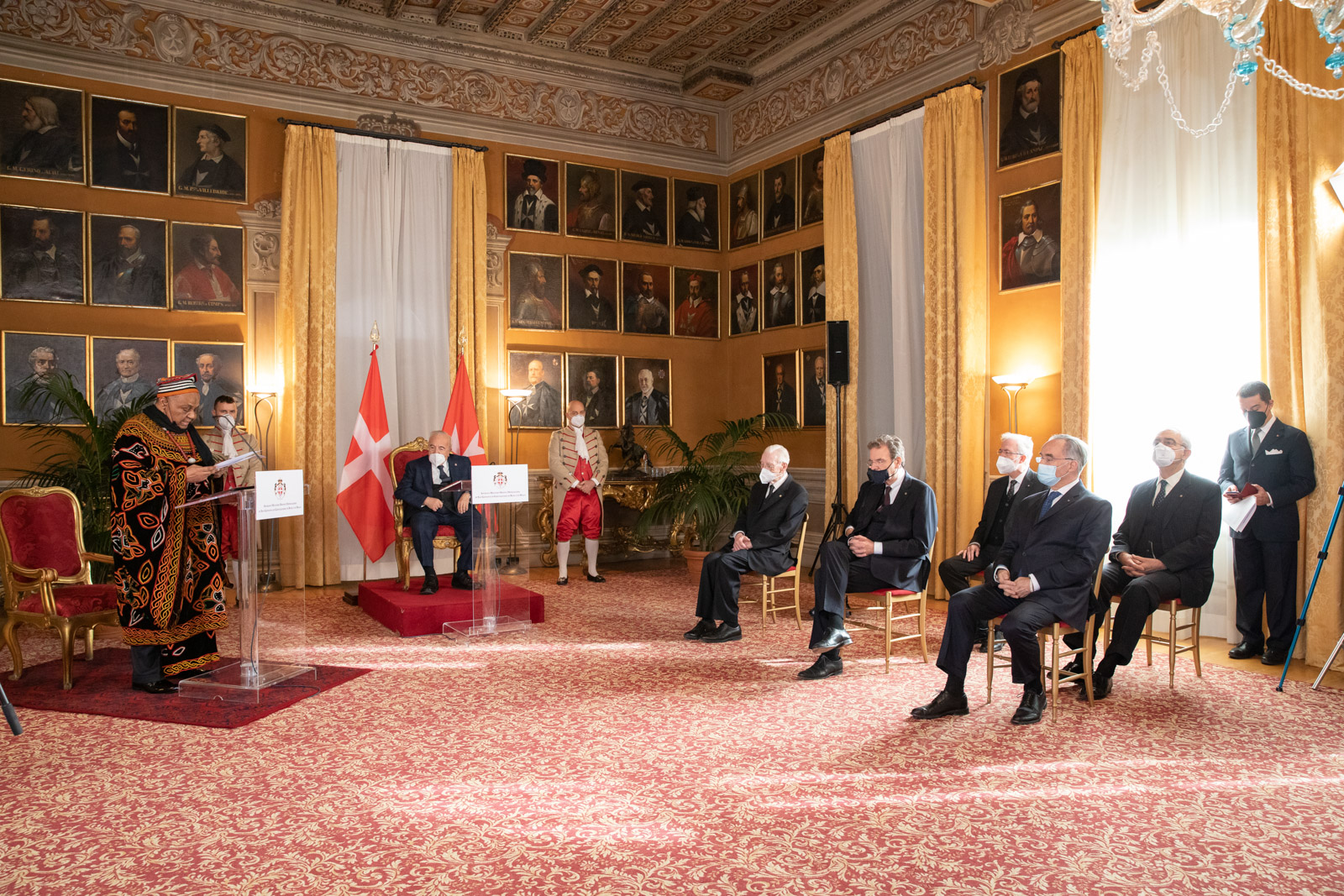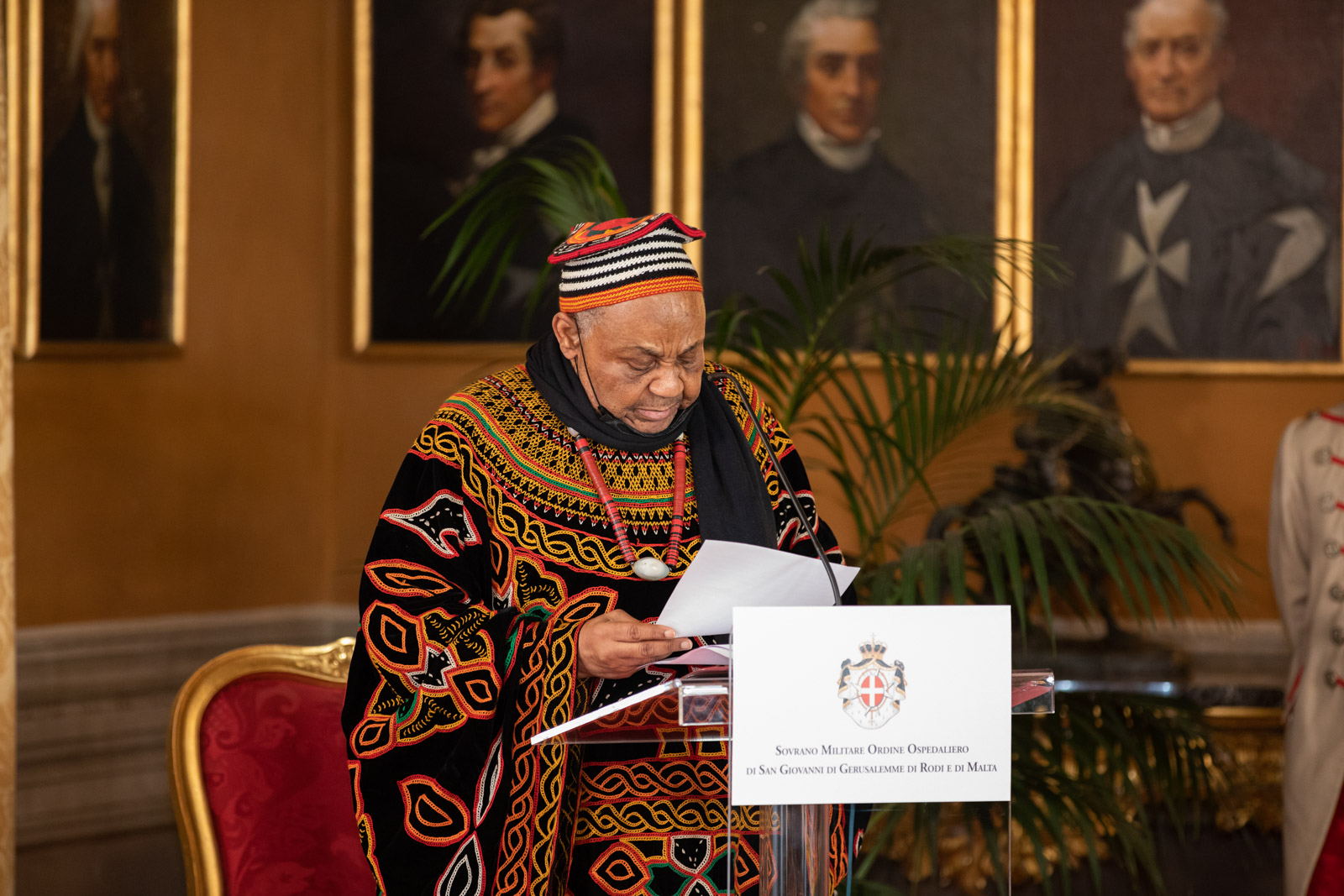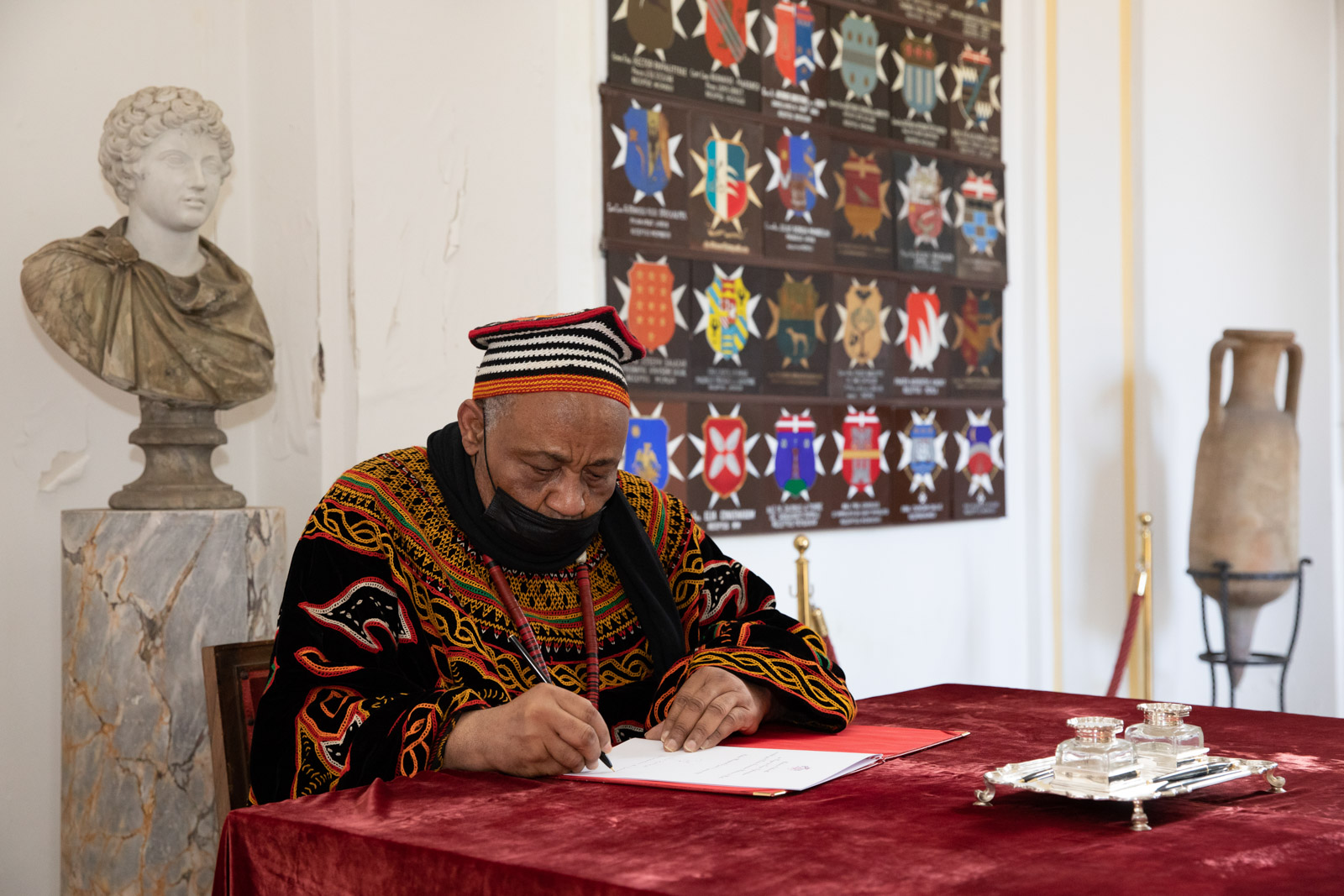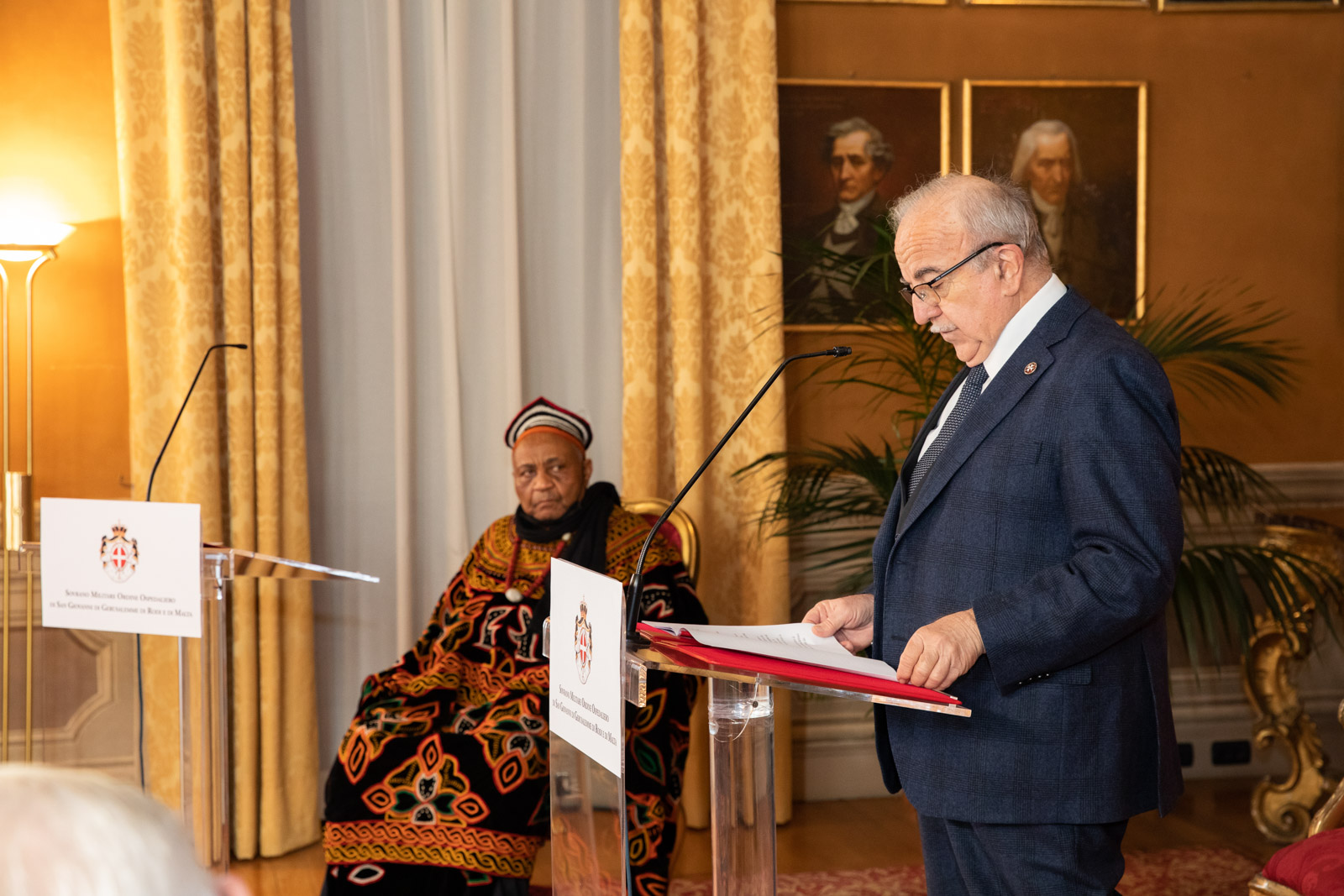The Lieutenant of the Grand Master Fra’ Marco Luzzago today held the Audience of the beginning of the year with the Diplomatic Corps accredited to the Sovereign Order of Malta, which was held in a reduced form due to the pandemic. The meeting with the Dean of the Diplomatic Corps took place in the Magistral Villa in Rome and was streamed live.
After the speech of the Doyen of the Diplomatic Corps, the ambassador of Cameroon Antoine Zanga, the Lieutenant of the Grand Master gave the following address
Mr. Dean, Excellencies, Ladies and Gentlemen,
Once again, this year the pandemic has forced us to hold our traditional audience with the accredited Diplomatic Corps in a reduced form. However, technology allows me to address you directly while you follow this audience remotely. I would like to thank the Ambassador of Cameroon, His Excellency Antoine Zanga, Dean of the Diplomatic Corps, who is here today representing the entire Diplomatic Corps accredited to the Sovereign Order of Malta, for his words and reflections.
I hope that the year that has just begun will also mark the beginning of the end of this long difficult period, tainted by uncertainty and instability caused by a world crisis in which we are all ‘in the same boat’, as the Holy Father often reminds us.
Data on the epidemiological trends of the pandemic tell us that this health and social emergency is unfortunately not over. While World Bank data record a sharp recession in the global economy caused by the pandemic. This figure is all the more discouraging if we consider the significant drop in the percentage of the population living in extreme poverty in recent decades, from 60% in 1970 to 9.2% in 2017.
The inequality in wealth distribution – which has been ongoing for decades – has worsened, pushing the poor ever more to the margins of society and plunging millions of families into poverty. After 20 years, poverty has risen again on a global scale. The total number of Covid-induced new poor in 2020 is estimated at 125 million.
The effects of this growing inequality are only too obvious. Without vaccinations available to every country worldwide, Covid is not only spreading among unprotected people who have not been reached by the vaccine, but is mutating, with new variants threatening all countries without distinction.
Vaccination rates in many global-south countries are still dangerously below the 40% target. This means that even today only 3% of people in low-income countries are fully vaccinated, while the figure is over 60% in both high-income and middle-income countries. This is an unacceptable trend in the face of a cross-cutting and indiscriminate health threat. This issue has been the focus of the numerous Doctor to Doctor meetings the Order of Malta has been organising for almost two years, involving ministers, health-policy makers and doctors from various countries in Europe, the Middle East, Asia and Central and South America. The aim is to promote a better knowledge and management of the virus, convinced that the best way to overcome this global challenge is a united and transversal response. Once again, the Order of Malta appeals for ‘vaccine diplomacy’ to be based on fraternity and ethics to ensure no one is left behind.
Some of the changes we are experiencing are inevitable: economic systems have been hit hard; the need to shorten the global value chain presents further uncertainties; trade relations have changed, and geopolitical balances have been upset. The world is increasingly split between those who defend the values of democracy and those who take an authoritarian stance against basic rights. It is no coincidence that the need to vigorously defend the principles of democracy and human rights is again being stressed.
I would also like to emphasise the centrality of the individual in the face of increasingly pervasive technological tools. The right to knowledge and transparency must never waver in the face of the growing development of artificial intelligence.
In this framework of unknown factors, fragility and uncertainties, the Sovereign Order of Malta daily renews its millenary mission expressed in its founding motto Tuitio Fidei et Obsequium Pauperum, defence of the faith and assistance to the poor. Whilst our 80,000 volunteers, 42,000 employees and 13,500 members are striving in every corner of the world to bring relief and comfort to those in need, the Order’s diplomatic network is actively engaged in planning and creating new synergies to promote the respect and sanctity of each individual’s life and the observance of human rights as enshrined in the Geneva Conventions. Collaboration between different actors in the humanitarian field remains essential. The Order of Malta firmly believes that people animated by the values of a sincere inspiration for peace and safeguarding of human dignity must unite to face the challenges of the millennium, and in this effort the role of religious leaders is fundamental.
Supporting the role of humanitarian institutions, facilitating inter-religious dialogue – particularly in the Middle East – and promoting international humanitarian laws and human rights are among our main objectives. As Pope Francis reminded us recently: “When the poor are rejected, peace is rejected. Closures and nationalisms, history teaches us, lead to disastrous consequences”.
In the wake of the growing xenophobic and populist movements, the Order of Malta has launched countless appeals to the international community to uphold human dignity and human rights and to stigmatise the growing inequality caused by the pandemic crisis, but not only.
It is clear to everyone that the fight against climate change must remain a primary and shared objective. The recent agreement reached in Glasgow gives us hope that – united – we will succeed in containing the inexorable rise in temperature that is changing the geography, wealth and biodiversity of our planet, increasingly threatening the most fragile communities.
*********
It is with great concern that we follow the crisis that has erupted over the last few days in Kazakhstan and the dramatic news from the Polish and Belarusian borders, where thousands of migrants have been stranded for months now, victims of political brinkmanship. Their conditions have become even worse with the arrival of the cold weather. Our German organisation and our embassy in Minsk have stepped in to support Caritas and food and basic necessities are being distributed to the migrants. Using migrants for political purposes is unacceptable.
We are also following the development of the situation in Afghanistan with great concern. Speaking at the thirty-first special session of the United Nations Human Rights Council in Geneva on the situation in Afghanistan, the Order’s mission stressed the need for “efforts towards an inclusive peace and reconciliation process”. The Order of Malta’s Albanian organisation, in coordination with the Ministry of Foreign Affairs in Tirana, is actively involved in assisting Afghan refugees. Various Italian delegations and our relief organisation in Lithuania have also arranged to host and aid several Afghan families.
The year 2021 marked the tenth year of war in Syria. With a death toll of some 600,000 people and several million displaced, it has become the deadliest conflict of the 21st century. Since the beginning of the civil war, Malteser International – the Order of Malta’s international relief agency – has been working to provide humanitarian assistance, water and sanitation in camps for displaced persons as well as urgent medical care and psychosocial support. The situation is made even more dramatic by the spread of Covid. This is why our structures have been active in providing hospitals with oxygen and personal protective equipment, and in organising awareness-raising campaigns to reduce contagion.
There are numerous frozen conflicts, which are in fact unresolved and continue to create tensions. Here, too, I appeal for full respect for human rights.
The Order has a deep-rooted presence in the Middle East. In Iraq in particular, our international relief agency has set up a €30 million project to support the return of communities displaced by persecution in the Nineveh Plain. In addition to providing a sustainable and dignified daily life through the reconstruction of damaged houses, Malteser International has provided money and business development support to improve living conditions and promote the economic development of families.
*********
Protecting the rights of minorities remains an imperative at a time when there is a growing risk of a return to the logic of power, nationalism and populism at the expense of the logic of dialogue. People of good will are called upon to make their voices heard to guarantee the rights of all and of all minorities, respect for human dignity, international cooperation and solidarity. This is the spirit in which Malteser International is developing its projects in Bangladesh to protect the Rohingya minority which has been subjected to discrimination and persecution for years.
The collapse of the Lebanese economy, the social crisis that has been going on for years and the continuing political stalemate are threatening the stability of the country, fundamental actor in the region, cradle of Christianity and example of peaceful coexistence between different faiths. The Order of Malta in Lebanon has expanded its support network, extending its reach to include the most marginalised. We run various health centres and several mobile clinics and have recently signed cooperation agreements with two hospitals in the country, providing further support to the national health system, particularly affected by the crisis and the pandemic. The Lebanese association has also commendably launched projects in the agri-food sector with the aim of improving the living conditions of local communities.
Lebanon is not the only crisis theatre in which our agencies and structures are working. Malteser International is actively involved in Haiti, which was hit by another violent earthquake last August – after the catastrophic one in 2010 – for the reconstruction of several schools and health facilities.
Last summer, the Order of Malta was also involved in Germany following the violent floods which hit some regions. Some 2,000 volunteers from all over Germany were mobilised to help. Once again, our volunteers worked with dedication and professionalism, coping with exhausting shifts and moments of great distress in the wake of this dramatic event which caused multiple victims and destroyed houses and infrastructure.
Our medical facilities in Africa are growing year by year. Malteser International recently inaugurated a new emergency operations centre for the public ambulance service in Nairobi, Kenya. The project also provides training for first responders and is added to numerous projects, especially for the diagnosis, treatment and prevention of tuberculosis and HIV/AIDS.
At the same time, our presence in Benin continues to develop. The Hospital managed by Ordre de Malte France in Djougou, in the north of the country, is a national reference centre for the treatment of new mothers and children. At the crossroads of Togo, Burkina Faso, Niger and Nigeria, it is the only hospital in the region with fully-equipped operating theatres and an essential laboratory.
I would also like to mention the invaluable work of the doctors and nurses of the Holy Family Hospital in Bethlehem, where around 4,000 new-born babies are born every year. A beacon of hope in a tormented land where the pandemic crisis has worsened the living conditions of many families, with repercussions on premature births. Since 1990, over 90,000 babies have been born in the Holy Family Hospital and several thousand have been treated because born prematurely or with congenital diseases.
Protecting but also enhancing different cultures and promoting the integration of minorities remains a cornerstone of the Order of Malta’s social work, which in recent months has opened its twenty-second centre for the Roma. The new centre, located in Ukraine, joins those already operating in many other areas of eastern Europe, such as Hungary, Romania, Albania and Croatia, offering children recreational and educational activities to improve their integration and reduce school drop-outs.
The Order of Malta’s age-old mission is expressed daily in the service of social canteens, distribution of meals and assistance to the most isolated and marginalised people, whose condition has worsened as a result of the pandemic. Some five million meals are distributed every year worldwide, from Europe to the Americas up to Oceania. Recently a delegation from the European Union, visiting the “Pope Francis” social canteen run by the Order of Malta in Pompeii, did not hesitate to describe it as “five-star” because of its cleanliness, orderliness, food quality and organisation.
With the same seriousness and commitment, we continue to care for the elderly while also trying to contribute to medical advances in the field of dementia. The programmes developed in many care homes start from a holistic approach: the person is considered in his or her deepest needs. Physical needs are equated with social, spiritual, relational and cognitive needs.
*********
The Order of Malta’s diplomatic activity has been instrumental in carrying out all the humanitarian activities I have just cited. Promoting inter-religious dialogue and recognising the fundamental role those religious leaders, institutions and organisations play in crisis areas is increasingly at the heart of the Order of Malta’s action.
The Religious Compact, a document created through cooperation between representatives of different faiths by the Order’s initiative, aims to highlight those principles shared by the main religions in which we recognise the values of fellowship, solidarity and respect for humanitarian principles.
This was the central theme of the G20 of religions held in Bologna in September as part of the G20 under Italy’s Presidency. Inspired by the theme ‘Time to heal’, the Order of Malta, led by Grand Chancellor Albrecht Boeselager, participated in numerous meetings focusing on the role of religious institutions in crisis theatres and the promotion of human rights in view of the multiple emergencies in the world, ranging from the pandemic to the wars in Sub-Saharan Africa and the Middle East.
The Order of Malta’s participation in international debates and symposia continues to grow. In November we participated in the Global Interfaith Summit in Dubai during the Expo 2020, attended by prominent leaders from Arab countries and representatives of the Muslim, Jewish and Christian religions. During the visit to the UAE, several high-level meetings were held with various ministers. These meetings and the participation in the summit were once again an opportunity to promote the value and importance of interreligious dialogue and to demonstrate the Order of Malta’s commitment in this direction. This commitment will be renewed in February during the Munich Security Conference, the most important annual forum on this issue, in which the Order of Malta has been participating for several years.
Yet another example of the Order’s commitment to the promotion of human rights is the organisation last February of the course for Libyan authorities on the protection of migrants and refugees, together with the International Institute of Humanitarian Law of Sanremo, attended by various representatives of the Libyan government and institutions. Libya remains a hot topic on the geopolitical chessboard, both because of its political instability and because migratory flows have started to grow again, as the operators of the Order of Malta’s Italian Relief Corps on board the Italian vessels that come to the aid of shipwrecked people in the Mediterranean are well aware. A phenomenon closely linked to human trafficking, which the Order of Malta categorically condemns through its ambassadors at large for monitoring and combating this crime against humanity as well as its permanent missions to the United Nations in Geneva and New York. Over 16 online events – with several hundred participants from over 100 countries – were organised last year to raise awareness within the international community of this odious and criminal slavery.
Under Italy’s G20 Presidency, in October we organised a conference on telemedicine, a sector which – as Grand Hospitaller Dominique de La Rochefoucauld-Montbel said – had undergone rapid development following the Covid-19 emergency.
*********
Although the year that has just ended was marked by severe constraints, our institutional activity was very fertile. The establishment of diplomatic relations with the Hellenic Republic and the Kingdom of Lesotho brings the number of countries with which the Order has diplomatic relations to 112.
The Order of Malta’s presence in international forums is growing, as demonstrated by its recent admission as Permanent Observer to the Interparliamentary Union, the international body that brings together parliaments with the aim of supporting peace and cooperation between peoples and strengthening parliamentary institutions.
Our excellent relations with Germany were further strengthened by the visit of German President Frank-Walter Steinmeier last October. This served as an opportunity to take stock of the numerous joint projects in the humanitarian field, from Lebanon to Iraq.
Confirming our strong relationship, last May I received the President of Latvia, Egils Levits, who expressed his deep appreciation for the Order’s mission and assistance to their most vulnerable people.
To celebrate 70 years of diplomatic relations, the Minister of Foreign Affairs of El Salvador, Alexandra Hill Tinoco, was received at the Magistral Palace. It was a cordial and fruitful meeting during which the Order of Malta’s presence in the Central American country, which provides humanitarian aid and support to the population through a network of clinics, was highlighted.
In 2021 we also celebrated 30 years of the Order of Malta’s relief corps in Lithuania where it runs social medical programmes in 30 cities, assisting the elderly, the needy, the disabled and children from disadvantaged families. High-level meetings were held to mark the occasion, starting with that with the President of Lithuania, Gitanas Nausėda.
Foreign ministers from Argentina, Serbia, Palestine, Côte d’Ivoire, El Salvador, Estonia, Panama, Greece and two deputy ministers from Russia, were also received during the year.
The great challenges and abrupt adjustments imposed by the pandemic as well as its far-reaching social and economic consequences – in addition to the heath repercussions – were the focus of the working lunch between the Grand Chancellor, Albrecht Boeselager, and over 20 ambassadors from various European countries, which took place in Rome in the Magistral Villa last June, confirming the increasingly strong relations with European countries.
*********
What you have heard so far has been possible above all thanks to the sovereignty of the Order, a founding element of our constitution.
It is this sovereignty that has enabled the Order of Malta to build up its vast network of international relations through its own diplomacy committed to the constant support of its centuries-old humanitarian mission.
Work on the reform of our Constitutional Charter has continued over the past year and is at an advanced stage. Further meetings are planned in the coming weeks to further analyse and examine the outstanding issues. An Extraordinary General Chapter will be convened to approve the reform when as much consensus as possible has been reached on all the main issues.
Your Excellency Mr Dean, Mr and Mrs Ambassadors, it is with a wish for peace, health and serenity that I conclude our traditional meeting at the beginning of this year. I am very grateful to all those who have tuned in to follow the audience. I am certain that, despite the challenges that still lie ahead, we will continue to work together in solidarity to help those most in need.








